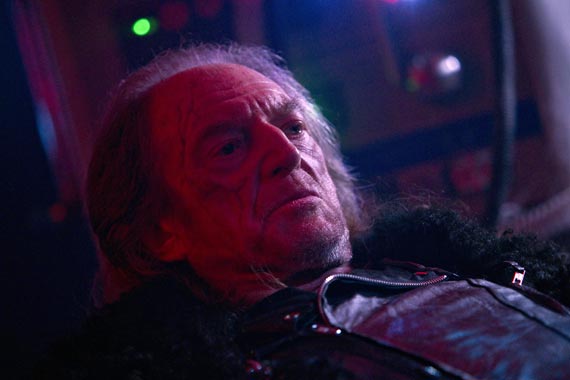Are Two Hearts Better Than One?

Guest contributor Mike Falino investigates the darker Doctor.
There seems to be an opinion amongst some Whovians that the Doctor is a perfectly moral being, or at least he is supposed to be. This sentiment, and the outrage over his seemingly immoral decisions in recent episodes, has grown in popularity as the Doctor has become darker and more brooding. This phenomenon has become most apparent during the course of the first half of Series 7.
The incident that seems to cause the most derision among Whovians is the Doctor’s treatment of Solomon, the murderous pirate in Dinosaurs on a Spaceship. After turning the tables on Solomon, the Doctor does not simply allow him to perish; he judges Solomon for his crimes and executes him. There is no way to interpret what he did any other way, and it is this stark, seemingly merciless Doctor that apparently offends some Whovians. They claim that it is not in the Doctor’s character to take such harsh actions, that behaving in this way is somehow “un-Doctorish”. It is as if they believe the Doctor is, and always has been, a complete pacifist, incapable of vengeance.
I contend that the Doctor has never been a perfectly moral being, and in fact, is far more human in his actions than some would like to believe. His unique position is that of knowledge and technology, not morality. The Doctor has the means to reshape the universe to his will, but often chooses not to in light of the consequences. There are times that the Doctor does claim moral superiority and does intervene, and these instances do not always result in a perfectly good outcome. How many innocent people have died in his staunch defence of justice? Although his intentions are always of a pure and good nature, the result of his actions are rarely so benign that they can be completely justified.

For those taken back by the Doctor’s judgment and execution of Solomon, I refer you to his decision to murder millions of Racnoss children in The Runaway Bride, or his decision to allow Cassandra to suffer and die in The End of the World. the Doctor has never been a perfectly moral being, and certainly not the epitome of mercy. He does strive for such a lofty ideal, and does live by a strong and straight moral code, but he is by no means perfect in a sterile sense. He has killed, he has allowed others to be killed, and he has turned a blind eye to suffering. He is, in effect, as human as we are. It is important not to forget that Solomon was not innocent of the accused crimes; he murdered the Silurian crew, not to mention the lovable triceratops.
If you need any further proof that the Doctor is not a perfectly moral being, and that his execution of Solomon is well within his Modus Operandi, consider his actions during the Time War. the Doctor’s morality is anything but perfect. We can’t romanticize his decision to erase the Daleks and Timelords from existence and then deride him for passing judgment on Solomon. He does what he sees fit in the moment, as we all do. He is in every sense of the word a “good man”, but he is far from being a perfect moral entity.
I contend that the Doctor’s three most recent incarnations have all been, on occasion, less perfect moral exemplars than his earlier selves in Classic Who. There are more examples besides what I offered above that show the Doctor in NuWho has often exhibited ruthless subjective morality, especially in defence of his beloved Humanity. In fact, his actions at times can almost be seen as selfish. In Genesis of the Daleks the fourth Doctor has the opportunity to annihilate the Daleks from existence but pauses before setting off the bomb to ask himself “have I the right?” The modern Doctor’s act more decisively, without pause to consider the full ethical implications of their actions. Perhaps this was born out of necessity, the urgency and horror of the Time War, but it still holds true.
The Doctor routinely violates his own categorical imperative that all life has unalienable rights, often by taking it upon himself to decide that one life form has more of a right to live than another. Perhaps the reason fans accept this ambiguity is because his decisions tend to favour Humanity, or at least bipedal hominids we can relate to, and usually benefit those whore are obviously sympathetic. But when his actions are so blatant, even ruthless, as with Solomon, it seems to be too much for some fans to accept. It appears that in the Doctor’s case two hearts are not necessarily better than one.








